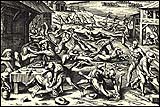ownership society
It always strikes me that ownership society is an oximoron. Society denotes shared rights and obligations, ownership denotes exclusive rights and privileges.
No wonder "ownership society" has become President Bush's logo for the second term: it has no anchor in reality.
The American colonies were an ownership society. Prior to the American Revolution, European sovereigns owned all the lands and granted them to colonists in exchange for allegiance and financial remuneration. Although this "society" included free people with money and property, bondsmen and ex-convicts with varying liberation timetables and rights, and women who were perpetually consigned to an inferior role, it totally excluded the prior inhabitants of the colonies. In fact, the ownership society prospered by killing off and expelling the indigenous peoples from their lands.
Those people just didn't have the same system of ideas about ownership, so they were excluded from the society.
The Cato Institute
The Cato Institute gives David Boaz a soapbox for promulgating their concept of the "ownership society." In his article, Defining an Ownership Society, Boaz begins
People have known for a long time that individuals take better care of things they own. Aristotle wrote, "What belongs in common to the most people is accorded the least care: they take thought for their own things above all, and less about things common, or only so much as falls to each individually." And we all observe that homeowners take better care of their houses than renters do. That’s not because renters are bad people; it’s just that you’re more attentive to details when you stand to profit from your house’s rising value or to suffer if it deteriorates.
Just as homeownership creates responsible homeowners, widespread ownership of other assets creates responsible citizens. People who are owners feel more dignity, more pride, and more confidence. They have a stronger stake, not just in their own property, but in their community and their society.
This is a very similar attitude to the colonists who could not value the native Americans' sense of society, with its sense of dignity, pride and confidence in an oriental/natural character. The person belonged to the community and the community had sovereignty over the individual, just as nature had sovereignty over the community and God over nature.
To limit feelings of self-worth to the ownership of objects -- manmade objects at that -- is to belittle the human character. Furthermore, self-improvement or improvement of some or all of an individual's conditions in life, is good insofar as it is profitable. According to Boaz
There's not much point in improving your skills, for instance, if regulations will keep you frm entering your chosen occupation or high taxes wiol take most of your higher income.Yes, it's wonderful for everyone to work hard, improve and earn more. What Boaz is missing is the distinction between HOW we live and WHAT we live FOR. The quality of human life is not measured in dollars and cents, as Ayn Rand wants all of to believe.
The Boaz/Bush obsession with individual behavior is stuck in adolescence and the conflict of the dysfunctional family.
If only everybody else would do what I want them to, then my life would be ok.Implicit is the idea that -- like the Powhatan Indians confronted by the first British settlers in Jamestown, people need to improve: gain dignity, pride and confidence as individuals for society to be healthy. A society of people who emphasize personal relationships, communion with nature through science, arts, or religion are not worthy to participate in society. They are to be excluded while the owners amass possessions of the commons and force the non-owners to join or rebel.
That's similar to what happened in Virginia in March, 1622:

The Wall Street Journal
Yesterday, the Journal did a front page feature on Bush and the Ownership Society entitled, "In Bush's Ownership Society, Citizens Would Take More Risk."
The President's policies, his advisers say, reflfect his deeply held belief that "ownership" has the power to transform people, just as he feels transformed by a midlife decision to quit drinking and embrace religion.I guess nobody told the President that there's a difference between "owning one's own problems," such as alcoholism and self-destructive hedonism, and owning shares in Exxon-Mobil.
As far as Social Security is concerned, the Journal goes on to explain Bush's "belief" that
with fewer workers supporting swelling ranks of retirees, the program by mid-century [2050 (or so?) Are we even going to be alive then?] won't be able to pay full promised benefits. That is the problem.I hate to be the person to break the President the bad news, but, we have worse problems than that that are going to hit us REALLY HARD before "mid-century."
Global warming is such a problem, and so is peak oil. Unsustainable agriculture and water shortages are probably much worse than any of those, because no politician, especially not any Republican, has even thought about addressing them.











0 Comments:
Post a Comment
<< Home